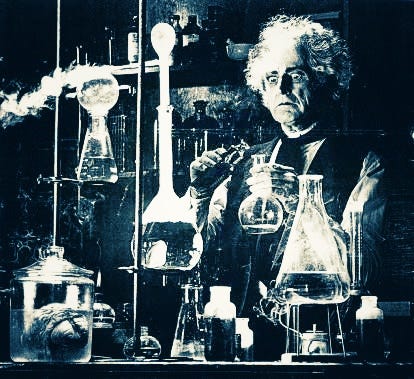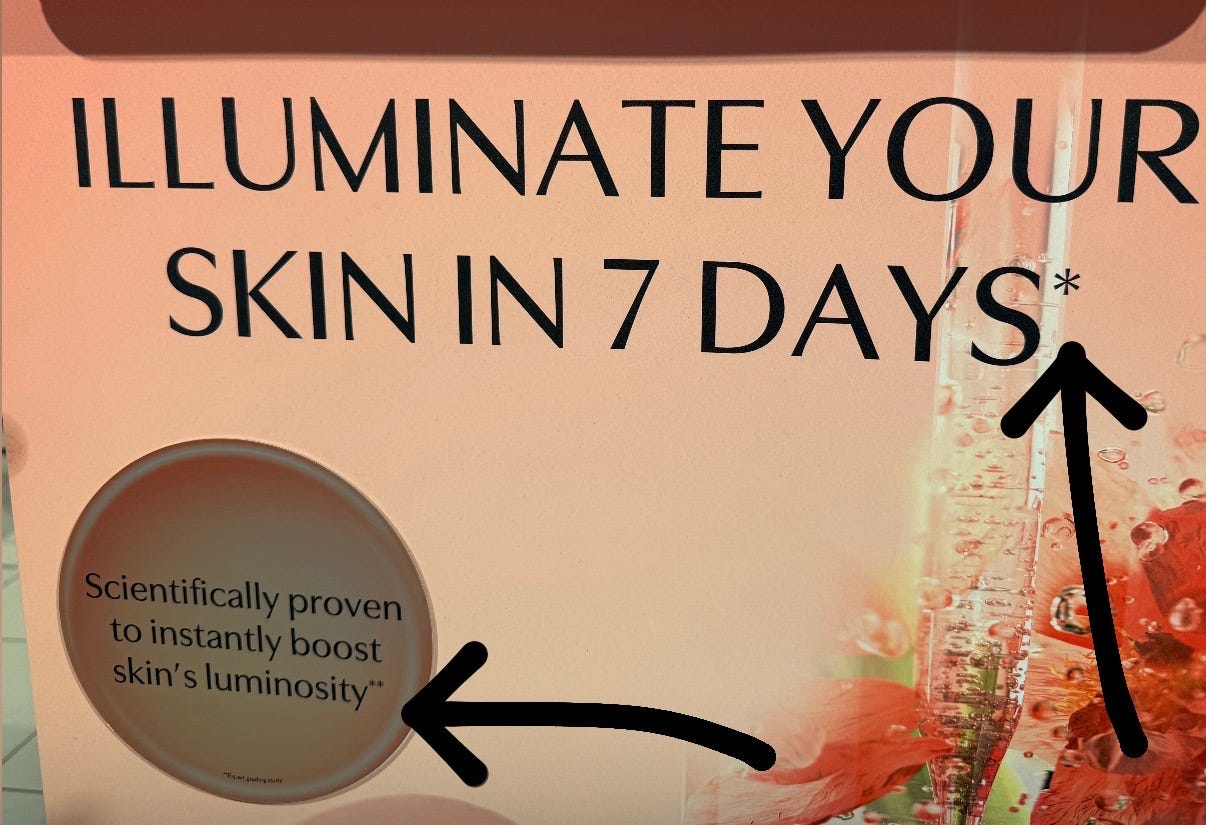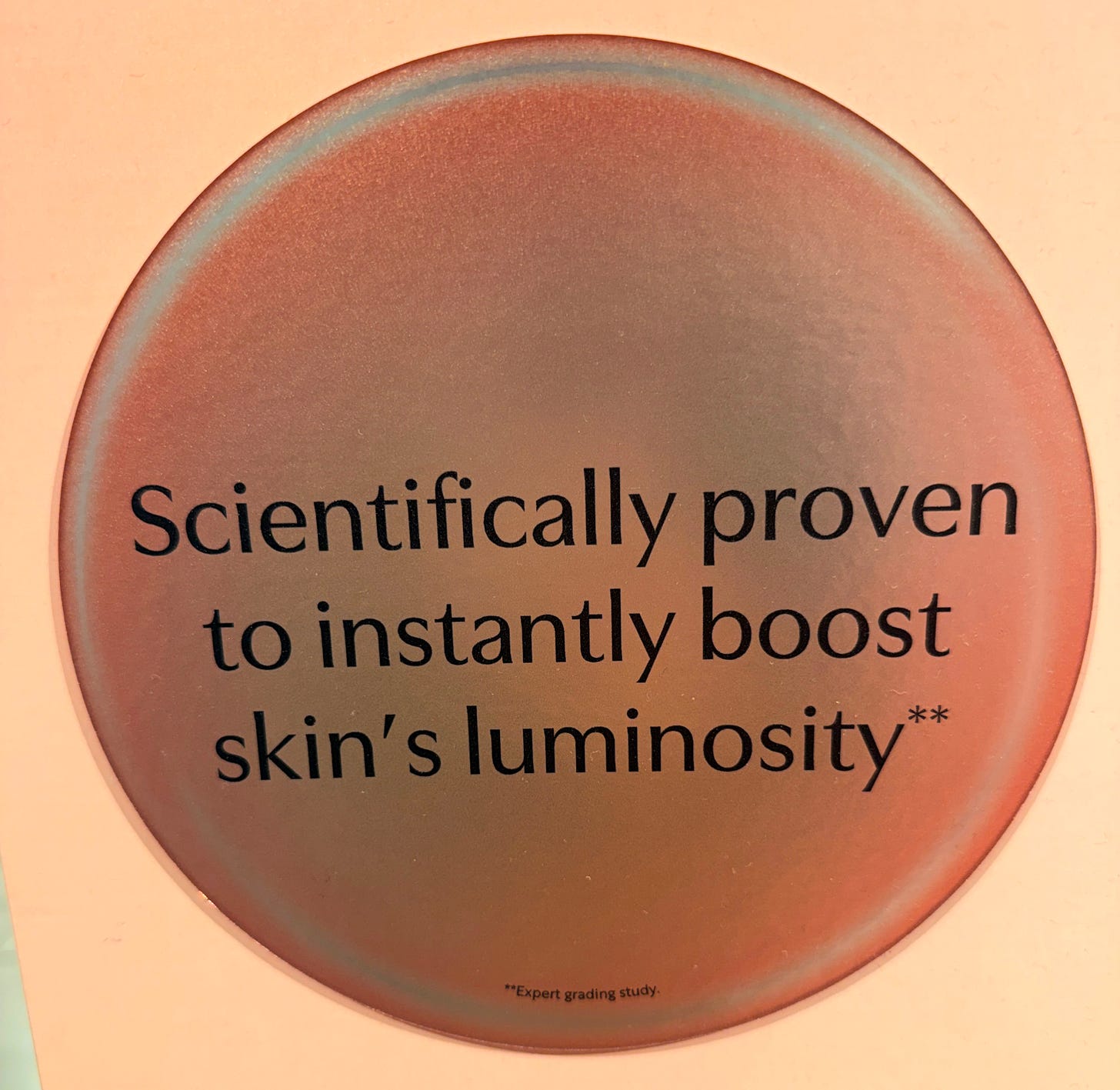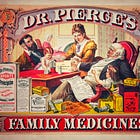“Clinically Proven” - a skincare marketing minefield
Don't let them blind you with 'Science'
We’ve all seen it, the glowing face, the woman in a lab coat and specs and the “clinically proven” in shiny font, persuading you to part with your cash in the pursuit of youth and beauty.
It implies rigorous science and incontrovertible results, conjuring up images of double-blind trials, control groups and peer-reviewed papers. It should at a minimum mean that the product’s efficacy has been independently confirmed.
Well…
What does “clinically proven” actually mean?
For a company to claim that their product is clinically proven, they need to adhere to the following:
Literally nothing.
There’s no universal standard for what qualifies as ‘clinical’ in cosmetic advertising. The phrase isn’t regulated.
So that means…?
As long as the company doesn’t outright lie about the results of their study, it can be any of the following:
Paid for and defined by the brand
Unpublished - i.e. you can’t see the methodology or unedited results
Small-scale - as few as 10 participants
Subjective - based on personal impressions rather than measurable outcomes
Beware the asterisk
There’s almost always an asterisk (sometimes more than one) in the ads for “proven” products.
Here’s one I saw in the wild recently (arrows helpfully added by me).
Now, I couldn’t even find the explanation for the first asterisk on the poster, but (handy arrow to the rescue) notice that there are another 2, even smaller ones, that do have a label1.
So this has been '“scientifically proven” by the company2 by them paying an expert to look at some photos of faces. Said expert has then determined (for money) that the skin’s luminosity has been instantly boosted.
You can instantly boost your skin’s luminosity by applying glitter to it. Which is a cheap shot, but I say it only to underline the absurdity of what’s happening here. “Scientifically proven” in this context has become “someone who is an undefined expert is something presumably sciencey (but undisclosed) has said that a person’s face looked shinier when they applied this product”.
Which isn’t exactly what you’d expect from “Scientifically proven to instantly boost skin’s luminosity”. It’s not a lie, exactly, but it’s a fucking stretch.
Check the sample size
I am yet to see a cosmetic ad ‘study’ that includes more than about 150 people, often of undisclosed demographics (eg skin type, age, diligence of application).
And, typically, they’ll say something like this3
”Appropriate for post-procedure use.”
Buried in the small print: Following an Intense Pulsed Light (IPL) Treatment, shown to be safe for use when applied 24 hours after IPL in 2 week tolerance usage test on 32 panelists.
That’s a pretty narrow interpretation of ‘procedure’ you’re using there
32 people
“87% of women saw more radiance”
“Saw more radiance” is about as subjective as you can get. This tells us that the subjects reported their own experience and weren’t independently evaluated by a dermatologist. Also, please objectively and quantitatively define ‘radiance’ in the context of skin. I dare you.
Small print: 47 women used the product for one week
Clinically proven to visibly slow skin ageing and deliver lasting hydration. *
The small print, pasted here in full: *CLINICAL TEST OF 56 DAYS. For [founder’s name redacted], skin ageing is associated with biological ageing, including the appearance of fine lines and wrinkles, loss of elasticity and vitality, dehydrated skin and dullness.
The fucking audacity of this. No details of the actual ‘test’ or number of participants, but some basic skincare trueisms thrown in as a distraction. For context, this product retails at over £200 for 30ml. With no facts to back it up.
So… is anything real?
Of course it is. And I’m not here to dissuade you from skincare, or from buying products that you’re convinced are working for you.
But remember that skincare marketing exists to benefit the corporation, not the consumer and employ some healthy scepticism about claims like these. If you’re about to buy something - particularly something notably expensive - on the basis of its claims, make sure you understand a) what those claims are and b) what available evidence backs up those claims.
This may help:
Are the publicised results objective?
Subjective tells: “felt softer,” “saw a difference”, “appeared smoother.”
These all mean that participants self-reported after looking in a mirror and weren’t evaluated in person by a dermatologist/other skincare expert
Are the results measurable?
These aren’t quantifiable: “Glow”, “radiance”, “youthful” etc
If you’re spending your money on products based on their scientific credentials, make sure you’re being sold something quantifiable
Who ran/paid for the study?
If it’s brand-funded and unpublished, treat it as marketing, not evidence.
Do they even have metrics to define and back up their claims?
An alarming number don’t. If clinically/scientifically proven is an important factor for you, run from these products/brands.
This does feel like a fucking minefield
Told you so. And this is just one aspect of it. I cover some more marketing bollocks here, if you can bear it.
What can you do?
Use the checklist above. And make sure you’re ingredient-driven rather than jargon-driven. There are many ingredients that are proven to work in independent, peer-reviewed studies. Buy products that contain these. Don’t get conned into paying more for those ingredients because an actor holding a test tube makes you feel like you’re suddenly in on some hidden skincare secret4.
This will help if you’re an absolute beginner:
And never buy anything that’s out of your usual budget without doing some research.
Until the next time! x
In teeny-tiny writing, which is no accident
I’m not going to name them, I’m here to raise awareness, not demonise anyone
These are all real and taken from the relevant company’s websites today. Each took me under a minute to find. This shit is pervasive.
Most topical skincare innovation at this point is a new way of dispensing/applying a known ingredient. The true innovation right now is in injectable/laser tech. Not something in a bottle.









Loved this one - very enlightening. I’d never really given this too much thought but it’s made me look at my current skincare and the rubbish they’re touting about it!
An Australian comedian Wendy Harmer once wrote a piece about a product promising 90% more radiance. She wondered how much radiance was enough, and that perhaps if your boyfriend asked you to turn your face off when you came to bed at night, that was too much 😆